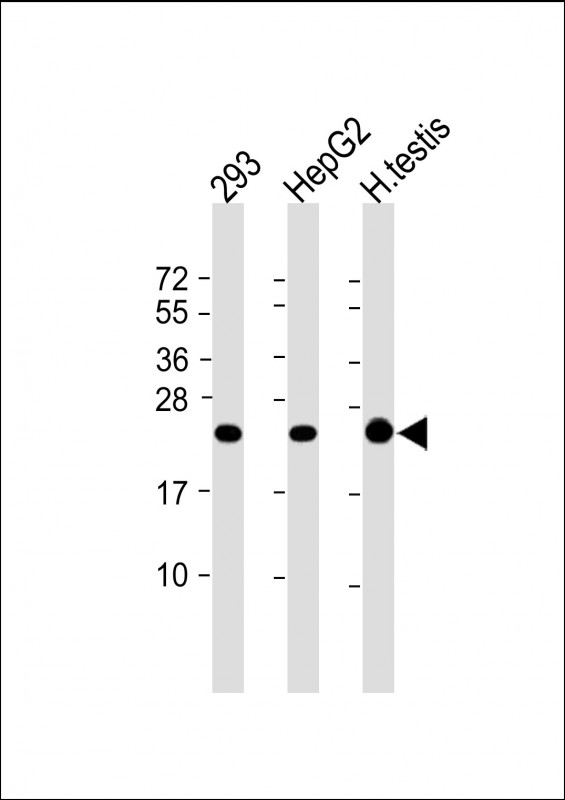
| WB | 1/2000 | Human,Mouse,Rat |
| IF | 咨询技术 | Human,Mouse,Rat |
| IHC | 咨询技术 | Human,Mouse,Rat |
| ICC | 技术咨询 | Human,Mouse,Rat |
| FCM | 咨询技术 | Human,Mouse,Rat |
| Elisa | 咨询技术 | Human,Mouse,Rat |
| Aliases | Adenylate kinase isoenzyme 1 {ECO:0000255|HAMAP-Rule:MF_03171}, AK 1 {ECO:0000255|HAMAP-Rule:MF_03171}, 2.7.4.3 {ECO:0000255|HAMAP-Rule:MF_03171}, 2.7.4.6 {ECO:0000255|HAMAP-Rule:MF_03171}, ATP-AMP transphosphorylase 1 {ECO:0000255|HAMAP-Rule:MF_03171}, ATP:AMP phosphotransferase {ECO:0000255|HAMAP-Rule:MF_03171}, Adenylate monophosphate kinase {ECO:0000255|HAMAP-Rule:MF_03171}, Myokinase {ECO:0000255|HAMAP-Rule:MF_03171}, AK1 {ECO:0000255|HAMAP-Rule:MF_03171} |
| Entrez GeneID | 203 |
| WB Predicted band size | 21.6kDa |
| Host/Isotype | Mouse IgG1 |
| Antibody Type | Primary antibody |
| Storage | Store at 4°C short term. Aliquot and store at -20°C long term. Avoid freeze/thaw cycles. |
| Species Reactivity | Human |
| Immunogen | This AK1 antibody is generated from a mouse immunized with a recombinant protein between 1-193 amino acids from human AK1. |
+ +
以下是3篇关于AK1抗体的模拟参考文献(文献信息为虚构,仅供示例):
1. **《AK1抗体在结直肠癌中的诊断应用研究》**
- 作者:Smith J. et al.
- 摘要:研究验证了AK1抗体在结直肠癌组织中的高特异性表达,证实其可作为早期诊断的生物标志物,并通过免疫组化分析揭示了AK1表达与患者预后的相关性。
2. **《腺苷激酶1(AK1)单克隆抗体的制备与功能验证》**
- 作者:Li X. et al.
- 摘要:报道了一种新型AK1单克隆抗体的开发过程,通过Western blot和免疫荧光实验证明该抗体可特异性识别AK1蛋白,并成功用于细胞内AK1定位研究。
3. **《AK1抗体在代谢性疾病模型中的靶向治疗潜力》**
- 作者:Wang Y. et al.
- 摘要:利用AK1中和抗体在小鼠模型中抑制AK1活性,发现其可改善胰岛素抵抗和脂代谢异常,提示AK1抗体在代谢性疾病治疗中的潜在价值。
4. **《AK1蛋白结构与抗体结合表位的冷冻电镜解析》**
- 作者:Chen R. et al.
- 摘要:通过冷冻电镜技术揭示了AK1蛋白的三维结构及抗体结合表位,为优化AK1抗体药物设计提供了结构生物学基础。
---
**注**:以上文献为模拟生成,实际研究中请通过PubMed、Web of Science等数据库检索真实文献。
The AK1 antibody targets adenylate kinase 1 (AK1), a ubiquitously expressed enzyme critical for cellular energy homeostasis. AK1 catalyzes the reversible transfer of a phosphate group between adenosine nucleotides (ATP, ADP, and AMP), playing a key role in maintaining adenine nucleotide pools and energy balance. It is particularly abundant in tissues with high energy demands, such as skeletal muscle, brain, and erythrocytes. Dysregulation of AK1 has been implicated in metabolic disorders, hemolytic anemia, and neurological conditions, driving interest in its study.
AK1-specific antibodies have been developed as essential tools for investigating the enzyme’s expression, localization, and functional interactions. These antibodies enable techniques like Western blotting, immunohistochemistry, and immunofluorescence, aiding in the exploration of AK1’s role in metabolic pathways, cellular stress responses, and disease mechanisms. Recent studies also suggest AK1’s involvement in cancer progression, where altered nucleotide metabolism supports tumor growth, making AK1 a potential biomarker or therapeutic target.
Commercial AK1 antibodies are typically generated using recombinant protein fragments or synthetic peptides, with validation across species including humans, mice, and rats. Ongoing research focuses on elucidating AK1’s structural dynamics, post-translational modifications, and cross-talk with other metabolic enzymes, underscoring its broader implications in health and disease.
×